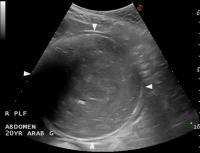Newsdate: Thursday February 09, 2023 - 11:00 am
Location: GILROY, California
Colic is a descriptive term, referring to a group of signs that indicate abdominal pain in the horse. Similar to the term “stomach ache” in humans, colic is a description, not a specific disease.

Colicky horse rolling on ground to relieve pain.
While some horses will exhibit dramatic signs from even a small degree of gas distension, other horses (especially older ones) may be very stoic, and show only mild signs.
© 2017 by Anastasija Popova New window.
Most forms of colic arise from dysfunction or obstruction of the gastro-intestinal tract of the horse. However, internal abscesses, kidney disease, and reproductive problems can all cause signs of colic as well.
Colic symptoms are generally related to the degree of pain and the horse’s ability to tolerate the pain. While some horses will exhibit dramatic signs from even a small degree of gas distension, other horses (especially older ones) may be very stoic, and show only mild signs in spite of having a severe condition.
- Looking at sides and flanks
- Loss of appetite
- Playing in water
- Stretching
- Pawing
- Getting up and down
- Rolling
- Elevated heart rate
- Elevated respiratory rate
- Standing with head down, looking “exhausted”
- Absence of sweating at times when other horses are sweating heavily
- Trembling
A colicking horse may show some of these signs, all of these signs, or none. Signs may change as the course of the condition progresses.
In a recent report from the UC Davis Center for Equine Health, author Rob Warren addresses the care of a horse, Oskie, with on-going episodes of colic.
Here is an excerpt from the article, "Collaborative Care Saves Horse from Chronic Colic Condition"
“Case of the Month” – November 2022

"Oskie, a 20-year-old Arabian gelding, had numerous mild colic episodes over the past two years. Thankfully, his owner is a veterinarian, and she knew how to treat the increasingly chronic condition in Oskie. But when she treated him a dozen times in one month, it was time to have his condition more thoroughly examined by the equine specialists at the UC Davis veterinary hospital."
"She suspected Oskie may have enteroliths, which are rock-like formations that form in the intestinal tract and cause blockage. Consisting of sand and other undigestible items that collect in the colon, enteroliths range in size from little pebbles to bowling balls if allowed to grow long enough."
See the complete article HERE. Article provided by UC Davis Center for Equine Health
